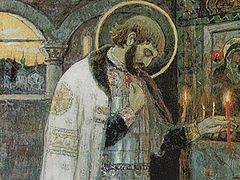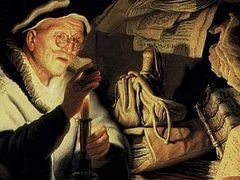In the name of the Father, the Son, and the Holy Spirit
Today at Divine Liturgy we heard the reading of the parable about the foolish rich man. Like most of the Gospel parables spoken by the Savior, it is at first glance clear, understandable, and applicable to life.
The ground of a certain rich man brought forth plentifully: And he thought within himself, saying, What shall I do, because I have no room where to bestow my fruits? (Lk. 12:16–18).
Is there anything out of the ordinary here? There are quite a few such rich men in our days.
But if we pay close and reverent attention to the sacred text, we will see many new meanings and paradoxes that we didn’t notice at a first and cursory glance.
First the rich man had a conversation with himself: What shall I do, because I have no room where to bestow my fruits…
But then he as if has another interlocutor. Who is it? It is his immortal soul. The rich man starts a dialogue with his soul, finishing this conversation thus:
Soul, thou hast much goods laid up for many years; take thine ease, eat, drink, and be merry (Lk. 12:19).
Not wishing to know what his wretched soul really needs, the rich man begins to as if force on it what he considers good—fancy dishes and drinks, and all sorts of luxuries and comforts. But the poor soul is tormented and suffers. This kind of comfort is not natural to it; it doesn’t bring it true joy and the feeling of a full existence.
Only a foolish man here on earth would offer a bone to a sheep and hay to a wolf. And so the Lord rebukes the foolish rich man:
Thou fool, this night thy soul shall be required of thee: then whose shall those things be, which thou hast provided? (Lk. 12:20).
This sentence is terrible for the rich man, but it contains a warning for those of us whose main goal in life is the acquisition of wealth and comfort.
So is he that layeth up treasure for himself, and is not rich toward God (Lk. 12:21).
We often do not think about the fact that the foolish rich man’s diligence towards his goal has penetrated the hearts of billions of people. It has become a curse, a sickness, a wound more terrible than any virus. This sickness is like an artificially created weapon of mass destruction—only it destroys the soul more than it does the body. And its creator is not man, but the devil. From the creation of man there has been a certain structure of the powers in his soul. They can be turned to the good, but also to evil. They can be the source of virtue as well as of soul-destroying passions. There is only one trait, one passion that is grafted into the soul artificially, from the outside: love of money. Love of money is a sort of vaccine that shields a person from God, from his own Creator and Redeemer, true Love and Freedom. It is no coincidence that the apostle calls the sickness of love of money the root of all evils. Mankind fusses, saves up, and drags rubles, dollars and euros not into his granaries but into dark rat’s nests sealed by bank codes. Someone gets rich, but the vast majority, alas, do not get rich in God. When a person, as we recall the words of the Gospel we endeavor to understand today, lays goods up for himself, Truth and Love remain outside his system of life coordinates. And this is already a terrible signal, an alarm that sounds the last, total-soul-destroying pandemic about which the apostle Paul prophetically tells us: And for this cause God shall send them strong delusion, that they should believe a lie (2 Thess. 2:11).
The devil is a liar and a deceiver. He has been deceiving the human race with his theory of infinitely expanding storehouses for thousands of years. Even today, people still believe this lie. But the lie consists in the fact that the storehouses are not within the devil’s power, because they are in essence nothing other than the time of our earthly lives—which is in God’s hands.
 Hieromonk Pavel (Shcherbachev)
Hieromonk Pavel (Shcherbachev)
And what does it mean to become rich in God? One remarkable spiritual writer, who was able to describe the subtlest facets of the human soul, St. Peter Damascene, briefly formulated an answer to the question of what fruits, what riches in our storehouses can bring us true comfort. Here is what he writes:
“To the extent that man thanks God and labors out of love for Him, shall God come nigh to him with His gifts, and desire to comfort him.”
It is remarkable that today’s Epistle reading also talks about the fruits of the spirit:
For the fruit of the Spirit is in all goodness and righteousness and truth (Eph. 5:8–9).
According to the thoughts of Elder Ambrose of Optina, by the word “truth” is meant the commandment of love for God. By the word “righteousness” is meant the commandment of love of neighbor. By the word “goodness” is meant kindness and simplicity in relationships with our neighbor and all benevolence and amicability.
Dear brothers and sisters, probably you have a right to ask the priest giving this sermon: Are there any rich people, maybe even our compatriots, who have shown us an example not of a foolish but a wise rich man, who gathers wealth not for himself, but who has become rich in God? We don’t need to look very far for this example.
Today the Holy Church celebrates the memory of an ancient Russian saint, a man of prayer, the supreme ruler of an enormous and wealthy nation, a fearless warrior, sage, who determined Russia’s path for centuries to come—Holy Right-Believing Prince Alexander Nevsky. In his capacity as ruler, Alexander Nevsky was faced with a choice: To either lose an abundance of earthly wealth by paying huge tribute to the Mongol Khan (and the demands were so unsparing that in 1262 they led to civil uprisings in Rostov, Vladimir, Suzdal, Yaroslavl, and other cities), or form an alliance with the Teutonic Order and the Roman Catholic Church, and receive a reliable defense against the Tatar-Mongols. But this alliance promising a tranquil life filled with earthly goods, required a renunciation of the truths of the faith—that is, all that made Orthodox Rus’ rich in God, enabled it to adorn with the fruits of the spirit the new House of Ephrathah, the chosen portion of the Most Holy Theotokos. As the chronicle tells us, at the Roman Pope’s offer:
“Prince Alexander, after taking council with his wise men, rejected [the offer of an alliance], saying: “From the First Council to the Seventh, all of this we know well. But we do not accept your teaching.”
Who knows whether there would even be a memory left of Holy Rus’ had the prince made a different decision… In the words of the Gospel: Whose shall those things be, which thou hast provided?
Alexander Nevsky’s contemporary, Prince Daniel of Galich, compromised the faith, maneuvered and acting cunningly in his life. But a hundred years did not pass after his death before his territory—the Galician-Volhynian lands—were taken over by Hungarians, Poles, and Lithuanians, who enslaved it for ages.
Let us also, brothers and sisters, vigilantly watch after the storehouses of our souls, fill them not with empty mirages of imagined riches and thoughtless comforts, but with the fruits of truth and love, emulating by our self-sacrificing service to God and neighbor our earthly and heavenly intercessor so honored by the Russian people and the entire Orthodox world—Holy Prince Alexander Nevsky.




